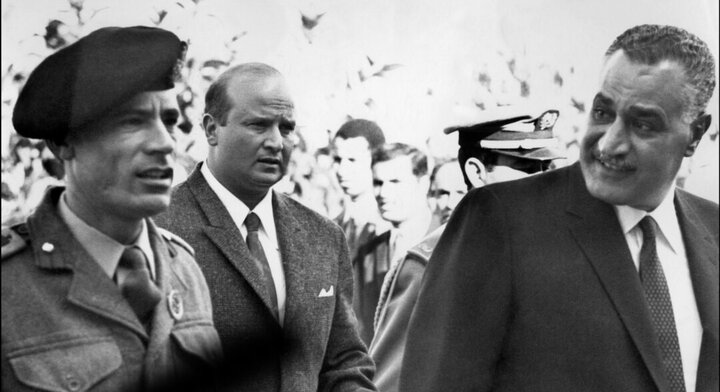What is the story behind the release of the controversial conversation between Gamal Abdel Nasser and Muammar Gaddafi

Leaked Audio Reveals Tense Exchange Between “Gamal Abdel Nasser” and “Muammar Gaddafi” on Palestine and arab States’ Stance, Sparking Reactions Among Arab Audiences
According to a report by the English section of Webangah News Agency, citing Mehr News Agency, an audio file has surfaced featuring a contentious conversation between Gamal Abdel Nasser, Egypt’s former president, and Muammar Gaddafi, Libya’s ousted leader (who was overthrown 42 years ago). The recording has drawn important attention from media outlets and Arabic-speaking audiences worldwide.The leaked audio dates back to two months before Abdel Nasser’s death in August 1970.
In the lengthy recording, the late Egyptian president—known as a staunch opponent of Zionism and anti-imperialist—criticizes some Arab leaders for their stance on the Palestinian issue and their conflict with the Zionist regime. He also accuses certain Arab states and Palestinian factions of merely paying lip service to Palestine’s liberation while failing to take concrete action.Egyptian President Stresses Need for Unified Arab Stance Against Israel, Warns of U.S. Backing for Zionist Regime
in a recent statement, Egyptian President Abdel Fattah el-Sisi emphasized that the Palestinian issue remains unresolved due to unwavering American support for the Zionist regime, wich emboldens its aggressive policies. He warned that continued U.S. backing enables Israel to exert further pressure on regional stability.
el-Sisi also criticized certain Arab nations—including Iraq,Syria,Algeria,and South Yemen—for their reluctance to confront Israel militarily or financially support Palestinian liberation efforts. He stated: “Egypt is prepared if these countries choose to engage in conflict with Israel but expects them to provide financial backing.”
The president condemned what he called the “revolutionary rhetoric” of some Arab states and Palestinian factions like Hamas, suggesting their calls for liberating Palestine “from the river to the sea” risk losing key territories such as Al-Aqsa mosque, Gaza, and even parts of Jerusalem within “a year or two.”
He added: “The rhetoric from Iraqi officials today implies we’re surrendering Al-Aqsa,Gaza,and Jerusalem to the Zionists—either now or in the near future.”Jewish settlements expand, and they never return.
Abdul Nasser points to the military superiority of the Zionist regime, which enjoys American financial and arms support, stating: “Israel alone has spent 400 million Egyptian pounds (Egypt’s currency) in a single arms deal to purchase weapons, while iraq’s armed forces budget is only 70 million pounds.”
He skeptically asked: “How do they intend to liberate [the land]?”
He emphasized: “A peaceful solution is the most realistic option but requires international pressure on israel through the United States.”
He added: “A peaceful solution is out of reach unless there is serious international intervention—not just our own strength.A firm international stance that compels America to pressure Israel.”
This audio file was released days after the U.S. president stressed the necessity of making the Panama and Suez Canals free for ship passage.An American had spoken, and it remains unclear why this audio file was released at this juncture. However, in the conversation, Abdel Nasser conditioned any Zionist passage through the Suez Canal on the realization of Palestinian rights.
According to Rai Al-Youm, Fawzi Al-Ashrawi, former advisor to Egypt’s foreign minister, stated that the leak of this audio file serves as new evidence of the Arab world’s dual catastrophe. On one hand, it exposes the deep divide between their public rhetoric and boasts versus the realities and calculations discussed behind closed doors in palaces and private chambers. On the other hand, it highlights the persistent and glaring disparity in power dynamics with the Zionist regime—the West’s spearhead planted in the region.
He emphasized that if we align both the text and underlying implications of this leaked audio with current circumstances—particularly regarding Palestinian resistance—we are entirely justified, like Abdel Nasser, in criticizing Arab states for evading substantive support on this issue while settling for mere condemnation and internal rivalries.Angry Political Reactions
Ashghavi further claimed: “We also have every right to criticize the resistance for carrying out a perilous attack without carefully calculating the balance of power, consequences, and repercussions. it is no exaggeration to say that none of the recent revelations serve as an exoneration for any regime, leadership, or historical era—rather, they stand as indictments against all. While these revelations shed some light on the darker corners of our contemporary history, sadly, this light is neither sufficient nor systematic enough to form an enlightening outlook or an impartial historical narrative.Ultimately, these disclosures are calculated and biased,” he said, adding that they neither serve national interests nor seek the truth.


